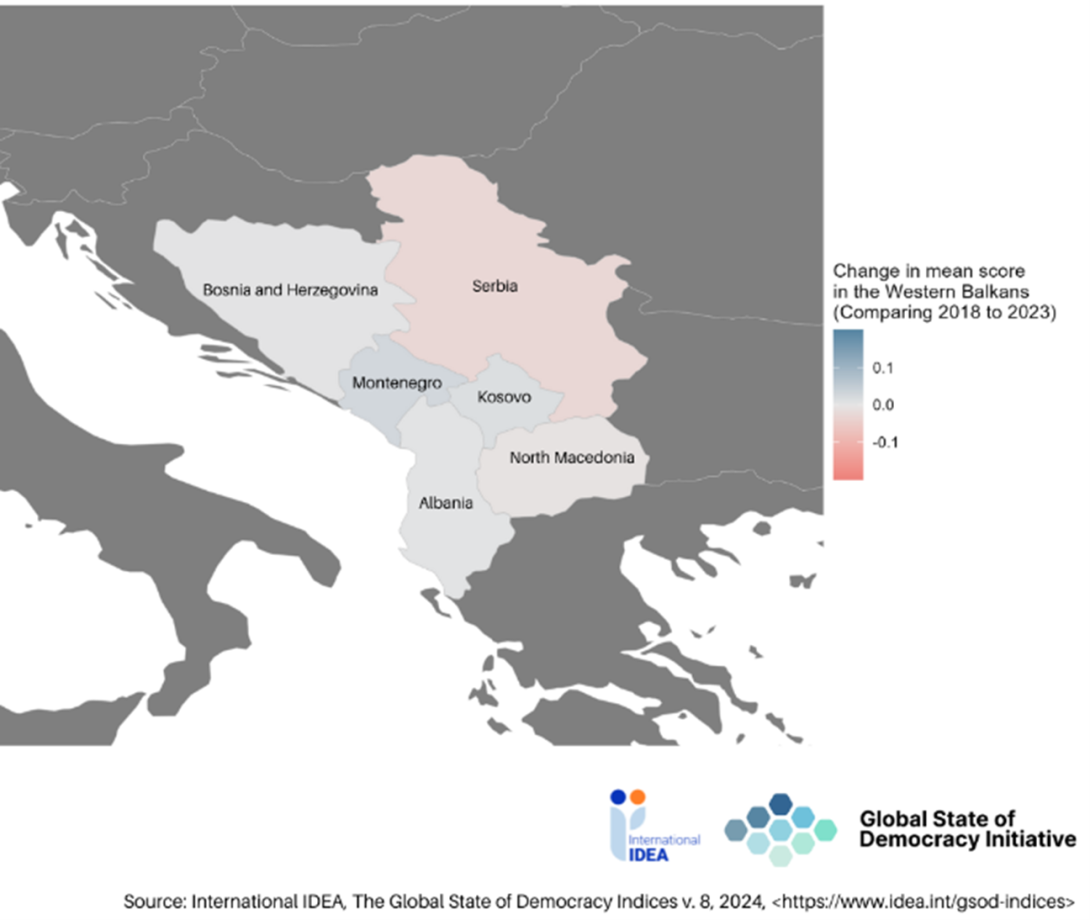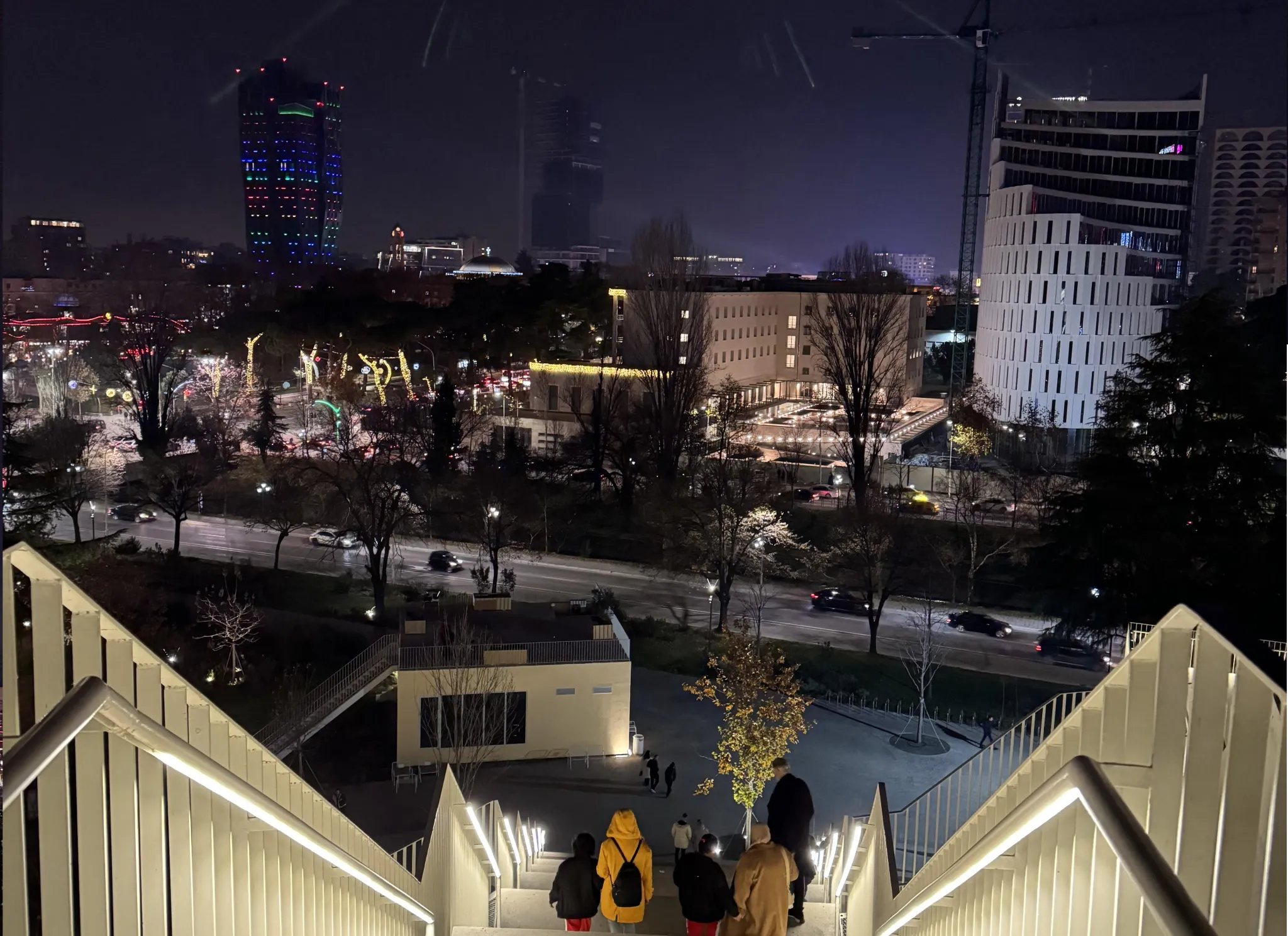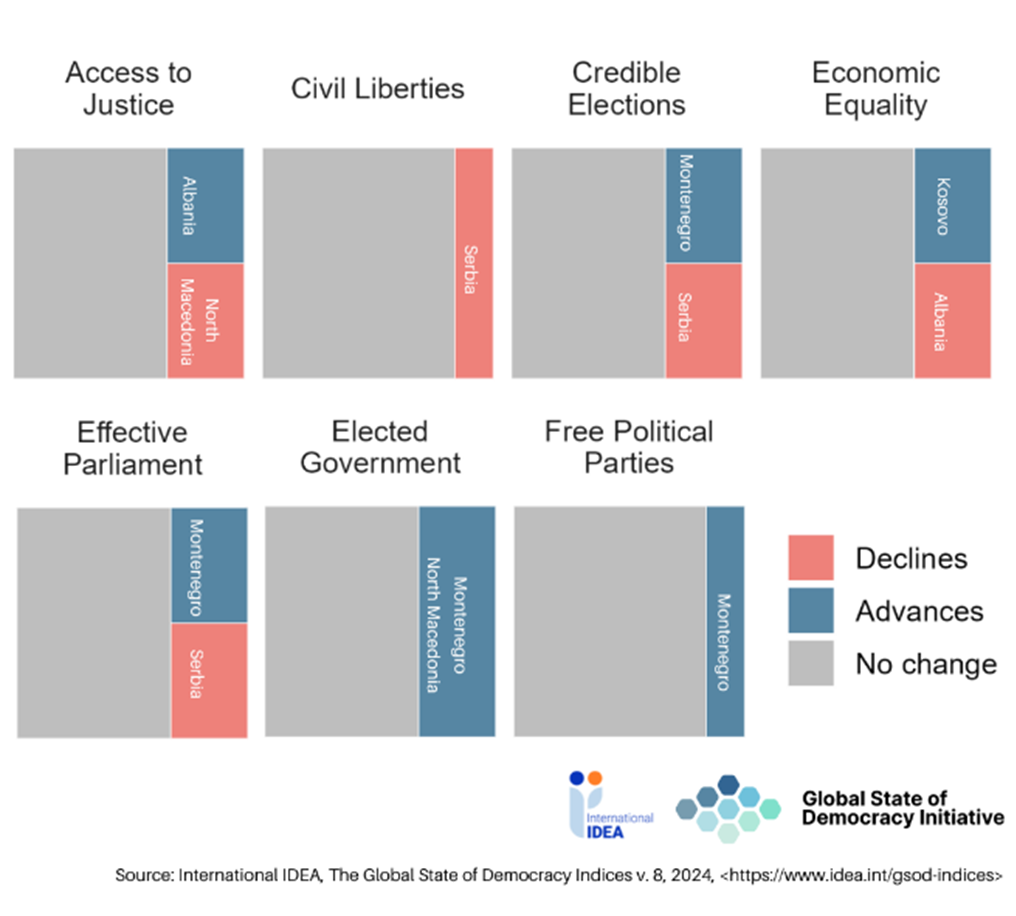
Unlocking opportunities for further democratic progress in the Western Balkans

Amidst a global and European context of democratic deterioration, people are looking for the good stories—places where there are reasons for hope. The Western Balkans tells such a story. Despite a gloomy outlook for democracy in Europe, from Russia’s war of aggression in Ukraine to democratic declines in traditionally high-performing countries, advances in the Western Balkans outnumbered declines between 2018-2023. In this context, the Western Balkans' progress should be treated as a vital opportunity for those championing democracy.
In the majority of countries in the region, democracy as measured by the Global State of Democracy Indices (GSoDI) has been improving, with Montenegro and Kosovo leading. With the exception of Serbia, which experienced the largest number of significant declines in GSoDI measures of democracy between 2018 and 2023, and Bosnia and Herzegovina, where the situation remained largely unchanged, all other countries experienced progress (Figures 1 and 2). Of course, it remains to be seen whether the progress reported through 2023 will hold, if the weaker areas can transform into areas of progress (recently published European Commission reports, for example, highlight continuing corruption challenges) and how the new U.S. administration might impact the region’s dynamics.
Although the situation still merits cautious optimism, GSoD data point to some bright spots that deserve attention and that could present a window of opportunity for democratic change. Democracy support actors (including governmental and non-governmental organisations, civil society etc.) might have a genuine opportunity to build on this progress, potentially making the region a strategic asset and a democratization success story.
Figure 1 - Map of change in the average level of democratic performance in each country (comparing 2023 with 2018)

Figure 2 - Statistically significant changes in the Western Balkan countries (2018-2023)

Why is this an important opportunity for democracy supporters?
The advances in the region are undoubtedly interlinked with EU accession processes, which provide assistance and incentives for reform. The majority of the Western Balkans governments remain steadfastly pro-EU and supportive of democracy, despite accumulated frustration over the EU integration process and waning EU credibility. For a region often referred to as “Europe’s soft underbelly,” this commitment shouldn’t be overlooked, especially at a time when crises in Eastern Europe have intensified. Georgia and Moldova, for instance, have been pulled between Russian influence and the West, and even established democracies like Austria have seen the rise of Russia-friendly far-right parties. However, Moldova’s experience serves as a reminder that, despite challenges, pro-democracy efforts can succeed.
‘Walking and chewing gum’: dealing with opportunities and challenges
The EU and pro-democracy governments such as the US should consistently provide political support to countries that genuinely embrace democratic consolidation, treating them as true partners, to reinforce a collective front against authoritarian influence. The EU’s "cash-for-reforms" strategy under the EUR 6 billion Growth Plan is an important step in accelerating reforms, but for lasting returns, this “investment” should be matched with consistent and principled political support. This approach should be grounded more firmly in fairness and transparency, and it should prevent double standards and shield aspiring countries from the internal politics of EU member states, which can disrupt the EU enlargement process.
North Macedonia’s accession saga and Kosovo’s years-long plight for visa liberalisation exemplify the politicization of what is supposed to be a merit-based process. In both cases, EU member states imposed new accession conditions after the agreed-upon criteria had already been fulfilled. Such developments were driven either by bilateral issues or the internal politics of these member states, creating the perception that the rules of the game were unfairly changed midway, undermining trust in the EU and leading to disillusionment.
In fact, in North Macedonia, nationalist leaders replaced the pro-EU government, rising to power on promises to resist further EU conditions they (and their supporters) deem unfair. They have openly expressed this, citing “20 years of negotiations, and 16 positive European Commission reports... just this one condition or just this one concession more.”
Experts have emphasized the need to address perceptions of the use of double standards. In June 2023, the EU imposed a number of political and economic measures on Kosovo, one of the most pro-EU countries in Europe, for its handling of tensions in the Serb-majority north. These measures remain in place, despite calls from member states, MEPs, and a recommendation from the EU’s top diplomat, to lift them. In stark contrast, Serbia faced no comparable actions, even as its actions were seen as more damaging to democracy at home and in the region. The country also remains supportive of Russia, and its President recently assured Putin that it will resist Western pressure to impose sanctions on Russia. What does the EU’s continued collaboration with Serbia say to the rest of the region? Could it be time to align EU statements against "business as usual" with Russia with action for those that want a place in the EU? Some policy-makers and experts propose sanctions and firmer measures to prevent aid from inadvertently supporting illiberal tendencies. Is this an effective approach? What could the (positive and negative) ramifications be?
Failing to hold illiberal governments accountable threatens to chill pro-democracy efforts and embolden such tendencies, thereby suggesting a prioritization of geopolitical interests over fundamental freedoms and democracy, leading to stabilitocracies. As we stand at a critical juncture, the future hangs in the balance, and democracy supporters must seize the opportunity while the momentum is still in their favour.




